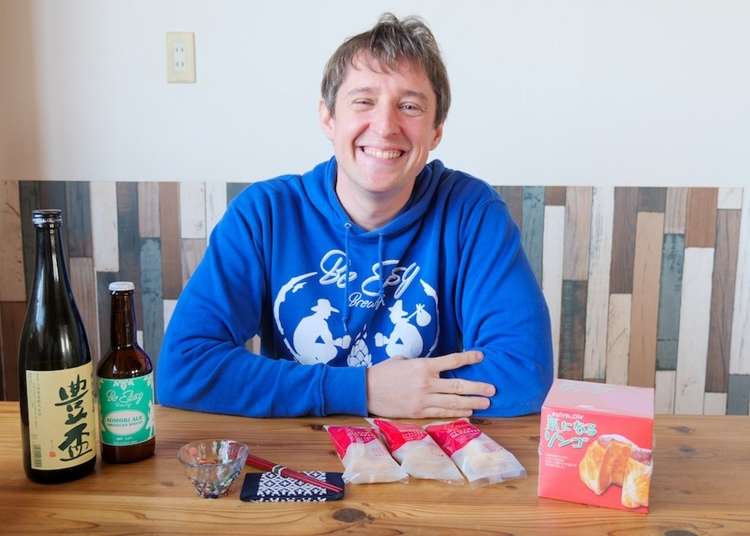
Aomori Prefecture is home to natural beauty, intriguing culture and history, fresh agricultural products, great seafood, and the eye-catching Nebuta Festival. And there are plenty of unique Aomori souvenirs and products that center on these local resources available in gift shops throughout the prefecture!
However, there are often differences in taste between Japanese and non-Japanese, making us curious about what’s popular among the latter. So we asked non-Japanese living in Aomori about which 10 souvenirs they’d recommend to international tourists.
(The following recommendations reflect the personal opinion of the interviewee.)
- Table of Contents
Gareth, born in the United States and currently living in Hirosaki
Born in Pennsylvania, Gareth Burns joined the U.S. Air Force after graduating from high school and was assigned to Misawa Air Base in Aomori Prefecture at the age of 19.
While serving as an airman, he became eager to experience Japanese culture and moved to Hirosaki upon completing his service. He also decided to begin brewing his own craft beer and opened a craft beer workshop and taproom in 2016.
He currently spends his busy, fulfilling days making a popular craft beer with fans visiting from all over the country, staring as an enthusiastic talent on local TV, and playing the Tsugaru shamisen.

Regarding the charm of Aomori, Gareth says, “Aside from Aomori apples, Nebuta, and Hirosaki Castle, there are many things in Aomori Prefecture that aren’t famous but are still interesting. They might seem commonplace to locals, but it would be a shame not to know more about them.”
With his knowledgeable point of view, Gareth happily shared his top souvenir recommendations, including a few he tried for the first time.

1. Apple Pie
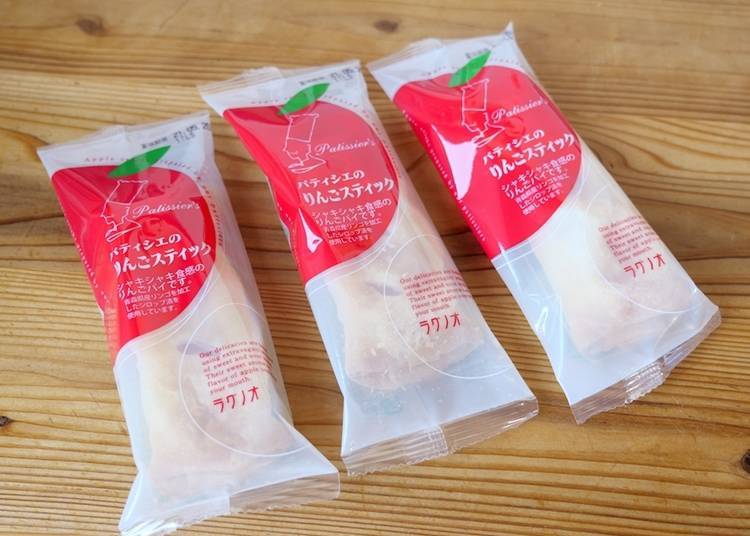
First off, apple sweets truly represent Aomori. Pies made with apples grown in the prefecture, Japan’s leading apple-growing area, are manufactured in Hirosaki City in western Aomori.
“Freshly baked is the best. I like when they contain custard and cinnamon, and the crust isn’t very thick. There are a number of types of apple pies sold in Hirosaki, so they’re fun to eat and compare,” says Gareth. He hadn’t tried some of the popular souvenir pies sold in the city previously but did so when we spoke.
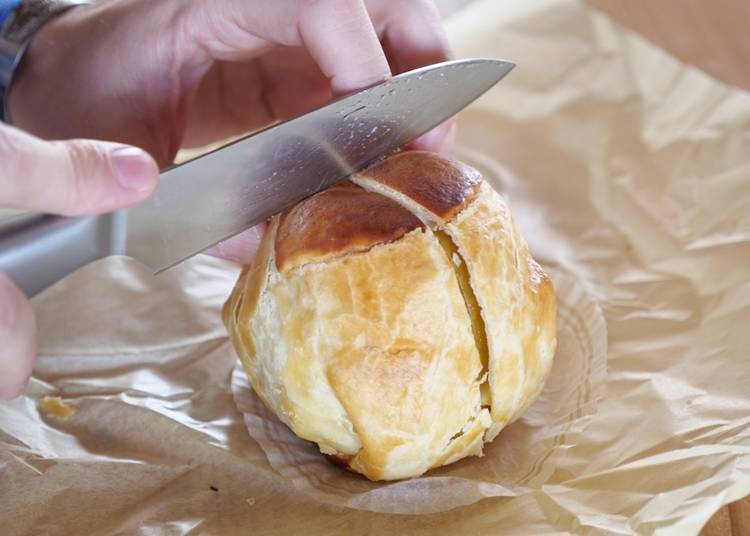
Upon taking a bite of a “Patissier’s Apple Stick,” Gareth exclaims: “Yeah, it’s delicious! I can taste a little cinnamon; the crust is soft and light. It’s easy to eat – this is a great souvenir.”
Then, he excitedly cuts a “Curious Apple” with a kitchen knife, eagerly eats it, and smiles, “This is delicious too! The big apple is delicious, and the texture is crispy.” These apple pies, popular with Japanese tourists, seem to be appreciated by non-Japanese too.
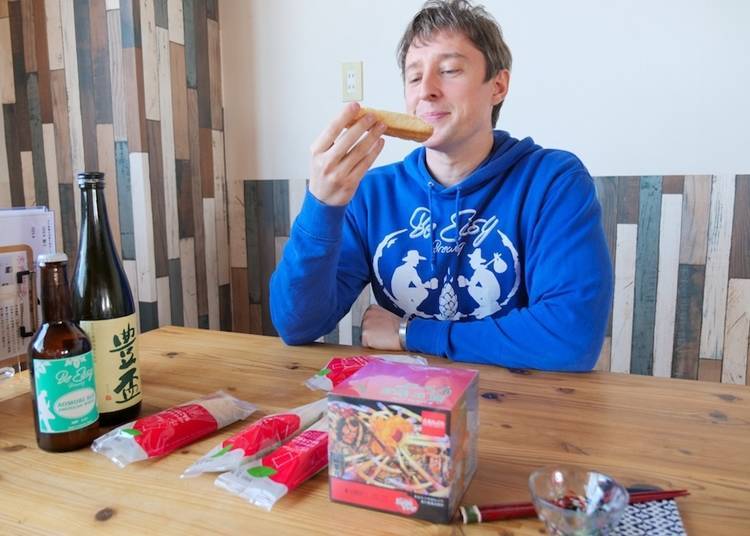
2. Miso curry milk ramen
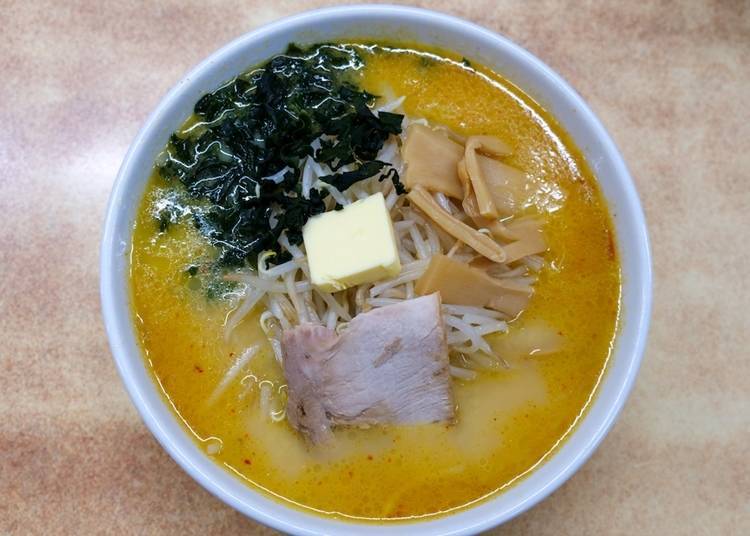
Next is Aomori’s soul food: miso curry milk ramen. This variety of ramen combines all the ingredients in the name, and Gareth has liked it since trying it for his work on TV.
“The three flavors don’t overpower each other, and actually have a mysteriously complimentary taste. In the United States, there are a lot of people who like strong-tasting foods, so I think they’d especially like it,” he says.
Cup ramen that keeps for a long time and uncooked noodles for home use are also available, making them great souvenirs for long-distance travel.

3. Oyama Senbei
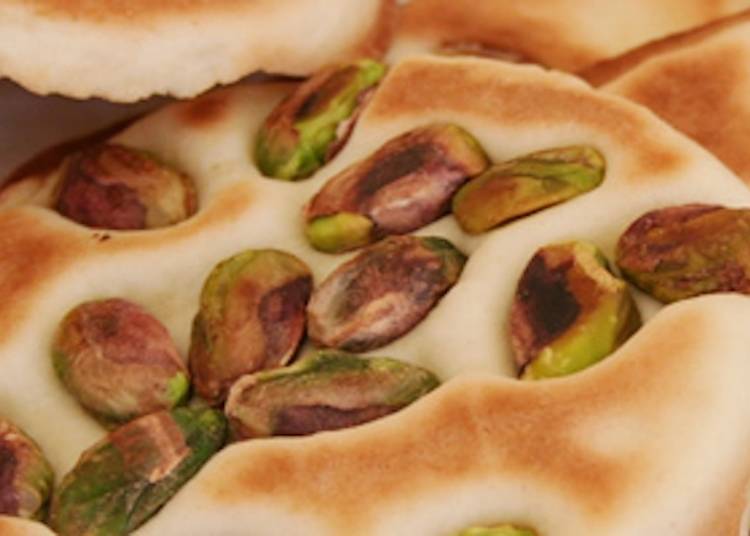
Tsugaru’s hand-baked “Oyama Senbei” rice crackers are another of Gareth’s recommended souvenirs. He says, “These rice crackers contain nuts and pistachios, and I think foreign visitors would absolutely love them.”
This popular product features high-quality nuts and crisp hand-baked dough that create a unique taste. Artisans carefully bake each rice cracker, and it’s fun to discover your favorite. Be sure to take a look at the baking process when visiting the Oyama Senbei store.
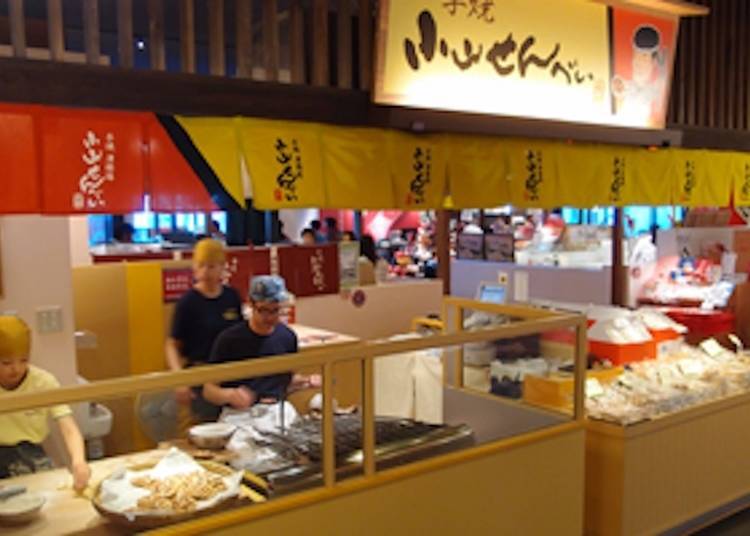
4. Dakekimi
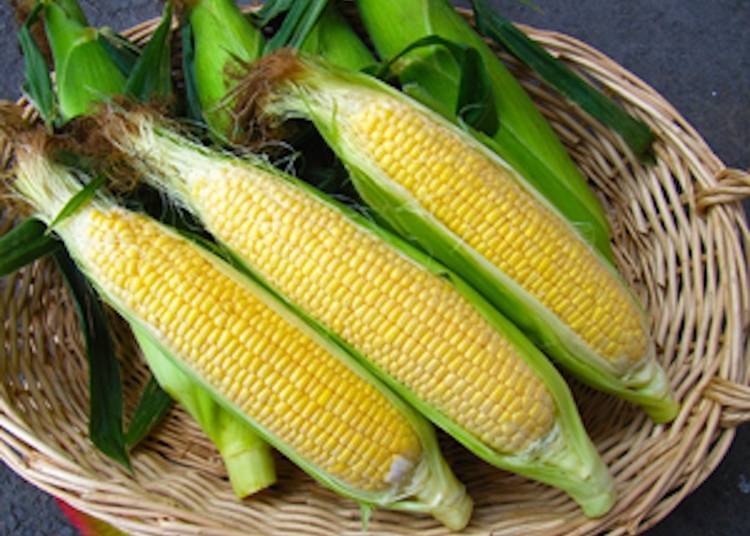
“It’s just sweet and delicious!” Gareth says in praise of the Aomori’s “Dakekimi” brand corn. Corn cultivated and harvested in western Hirosaki City’s Dake district, with growing temperatures around 18 to 20 degrees, is characterized by its sugar content, making it sweeter than some melons.
Gareth states, “The most delicious way to eat it is to simply boil it. But since it’s a raw product, I wonder if it can be taken overseas.”
While some ears are vacuum-sealed to keep their delicious flavor, the taste of harvest season (mid-August-September) corn is unmatched. Don’t miss it!
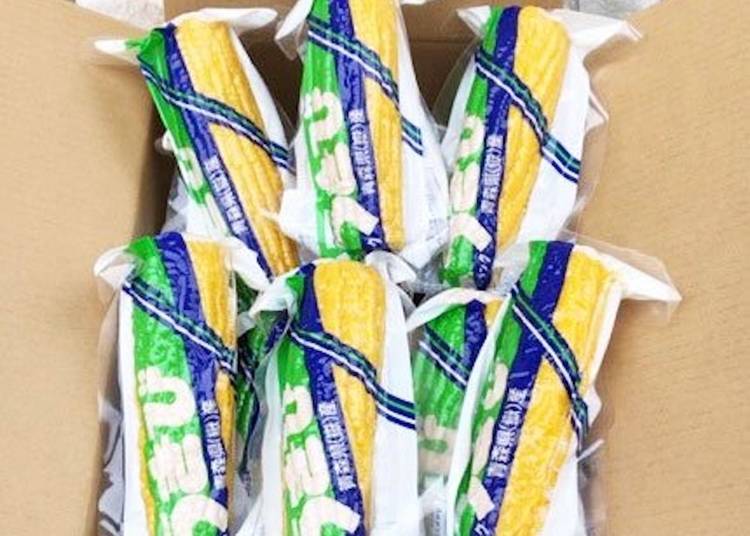
5. Kogin-zashi

“I definitely recommend traditional crafts,” says Gareth. For example, traditional sashiko (Japanese embroidery) “kogin-zashi,” the Tsugaru region’s popular handcraft with beautiful geometric patterns. Gareth focuses not on the design but on the history and origin of the art form.
Around 300 years ago, kogin-zashi began when sashiko was added to linen cloth so that even a little warm air could be trapped in clothes in the harsh winter cold. Being able to share that knowledge makes it an even greater souvenir.
Various kogin-zashi items are sold at souvenir shops throughout the prefecture, but Gareth recommends practical items like business card holders and coin purses.
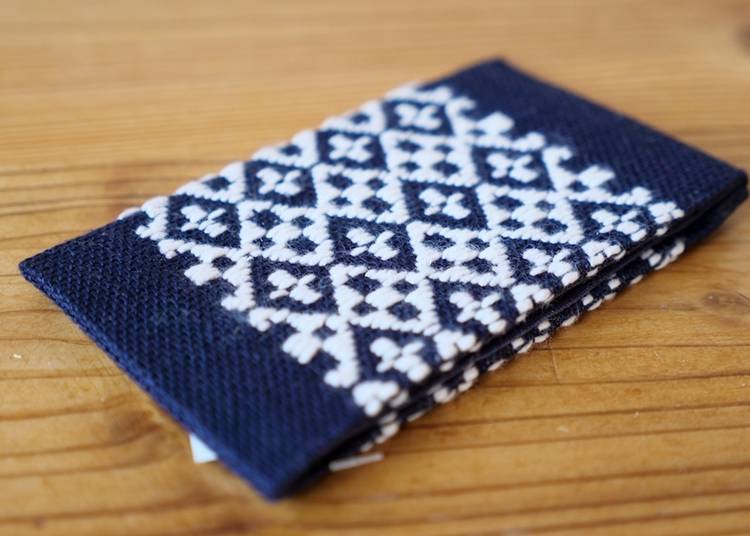
6. Tsugaru lacquerware
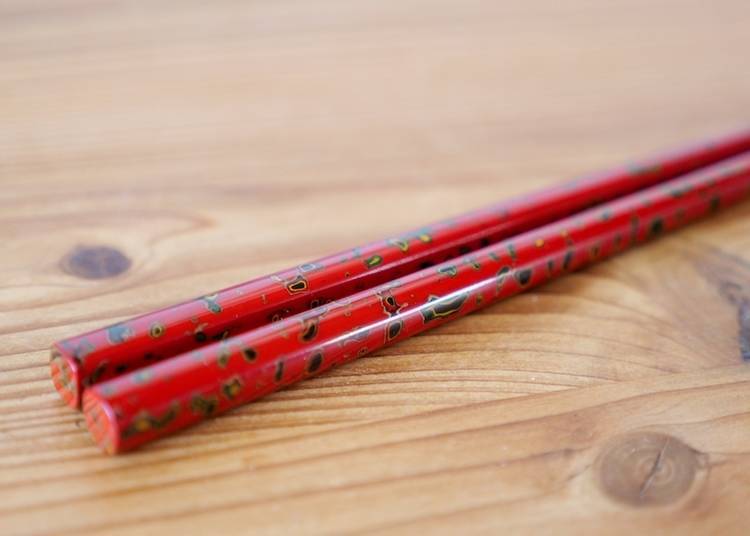
Next is “Tsugaru Nuri,” with its glossy, patterned surface, created by applying and polishing multiple layers of lacquer. This traditional craft represents Aomori Prefecture, but “it’s important to know the story of how it’s made,” says Gareth.
“People should know how much effort and time it took for the craftsmen to make it and how multiple layers of lacquer make it harder to stain. If you tell the recipient, they’re sure to be pleased.”
Each piece embodies the effort and skill of its creator, and standard items include chopsticks, bowls, cups, and plates.
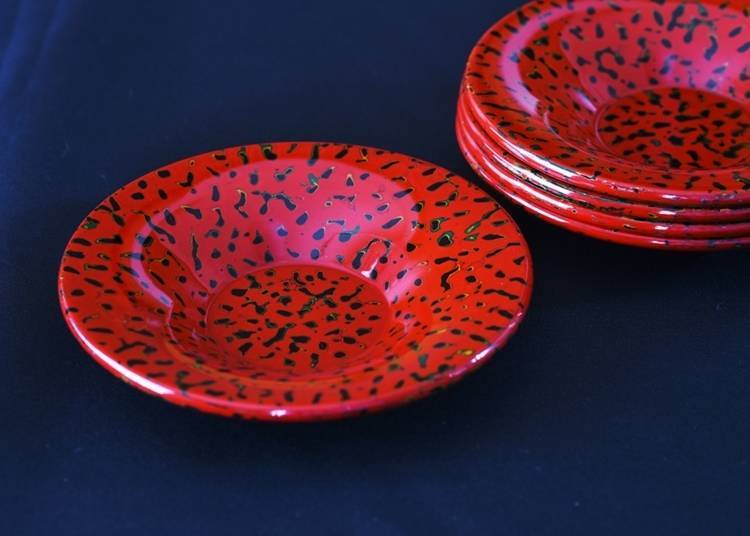
7. Tsugaru Vidro
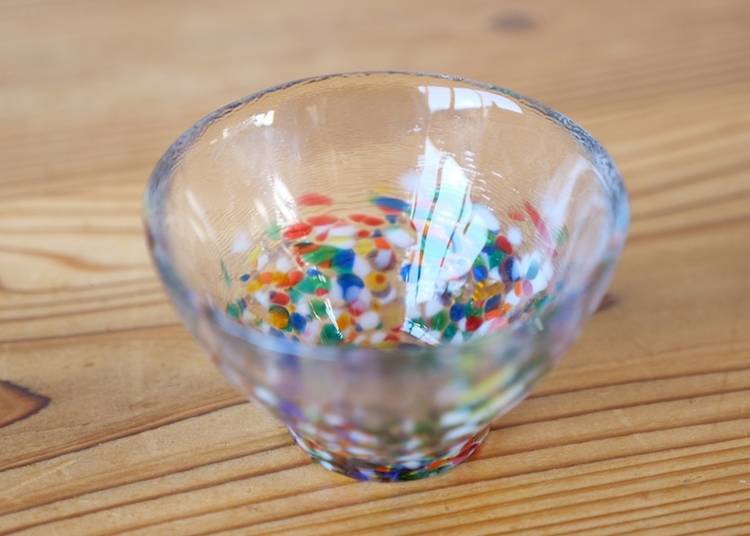
Gareth’s favorite souvenir is “Tsugaru Vidro” glassware, which conveys a feeling of the beauty and warmth of Japan’s seasons. “I think this is beautiful just looking at the design, but it’s even more interesting to know how it came about,” he says.
Tsugaru Vidro finds its inspiration in the form of glass floating balls traditionally used in the fishing industry. With skills gained over many years, artisans have mastered complicated techniques for shaping and blending the colors of the glass and have grown the brand into one designated as a traditional craft of Aomori Prefecture.
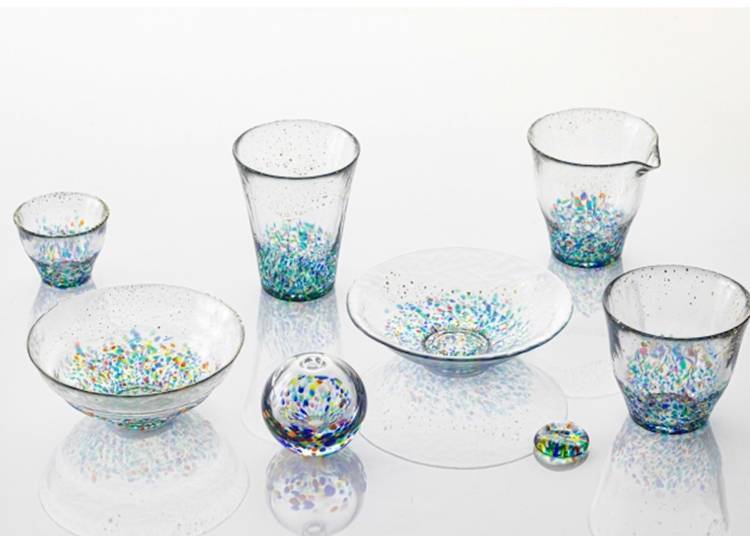
“It’s not just a beautiful glass product; it contains solid technology, an interesting history, and the creativity of craftsmen who carefully make each one. Some traditional crafts are expensive, but I don’t feel these are expensive,” says Gareth.
Products like sake cups and beer glasses are popular, and you’ll surely find a favorite among the wide variety of Tsugaru Vidro products.
8. Nebuta flute

The Aomori Nebuta Festival is one of three major festivals in Tohoku. The sight of a powerful “Nebuta” warrior float on parade is an impressive image, and Gareth recommends getting a “Nebuta Flute.”
When asked why, he says, “It’s a simple instrument, but it has a long history, and it’s interesting that the tones differ depending on the player.”
Gareth is so fond of festivals that he participates in the Nebuta Festival every year as a “haneto” – a dancer who excitedly and loudly participates in the festival. “If you bring a flute home, and play it, you’ll bring back memories of the festival,” he says.
Skill and a real flute are needed to produce the best sound, but the affordable flutes sold at souvenir shops still make perfect Aomori souvenirs!
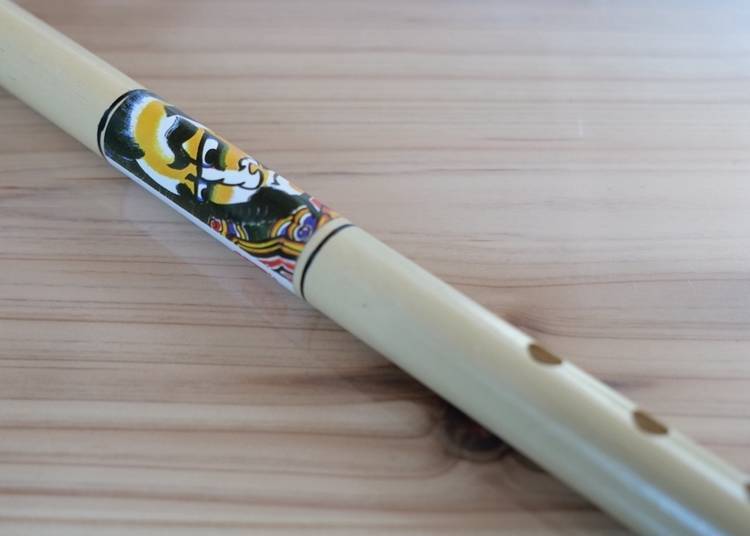
9. Houhai Sake

With Japanese food experiencing an upswing in popularity worldwide, sake has attracted increased attention as well. In particular, “local sake” from specific areas with distinct aromas and flavors is becoming a staple souvenir.
“Japanese rice is delicious, and there are many sake breweries that have been in business for a long time. There’s a variety of types, and the tastes differ even from the same brewery,” Gareth says.
When asked to recommend sake for novices, he immediately answers, “‘Houhai.’ It’s made at Miura Sake Brewery in Hirosaki City; it has a gentle taste and is easy to drink. Sake is classified as ‘dry’ or ‘sweet.’ I like Houhai because it has its own distinct taste.”
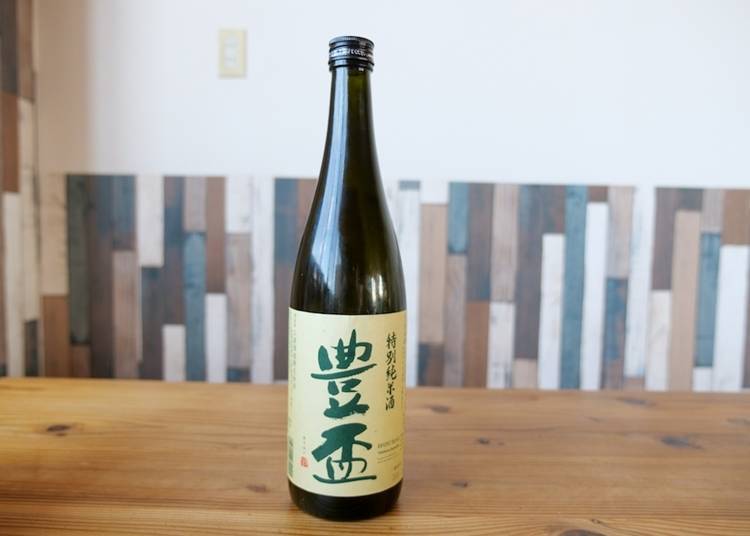
“If you’re sightseeing in Aomori, please try some local sake,” says Gareth. There are local sakes in addition to Houhai, so be sure to compare a few and pick up a bottle of your favorite.
10. Gareth’s craft beer
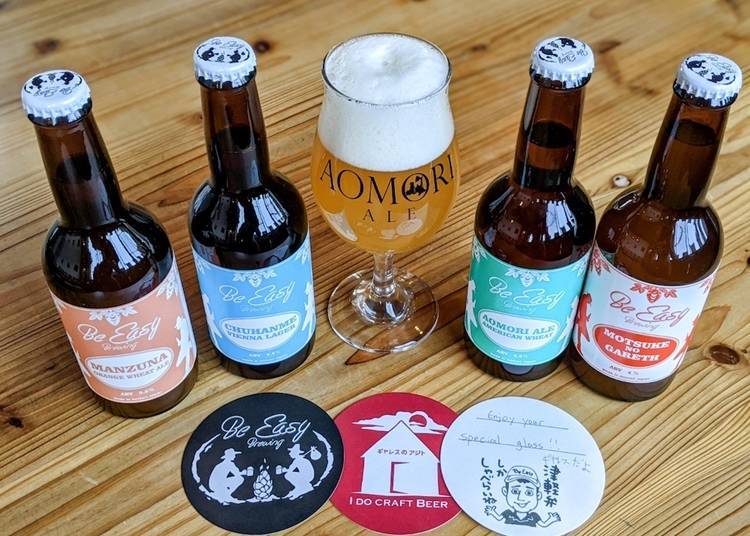
The last recommended souvenir is, of course, Gareth’s own craft beer. There’s a good variety of strong, rich, or fruity flavors, and refreshing, easy-to-drink beverages.
Among them, Gareth recommends “Aomori Ale” for beginners. A limited-edition dry wheat beer, it’s only available at 20 stores in Aomori Prefecture. There are also other products with a uniquely Aomori vibe, like a craft beer made with apple juice, so be sure to try a few!
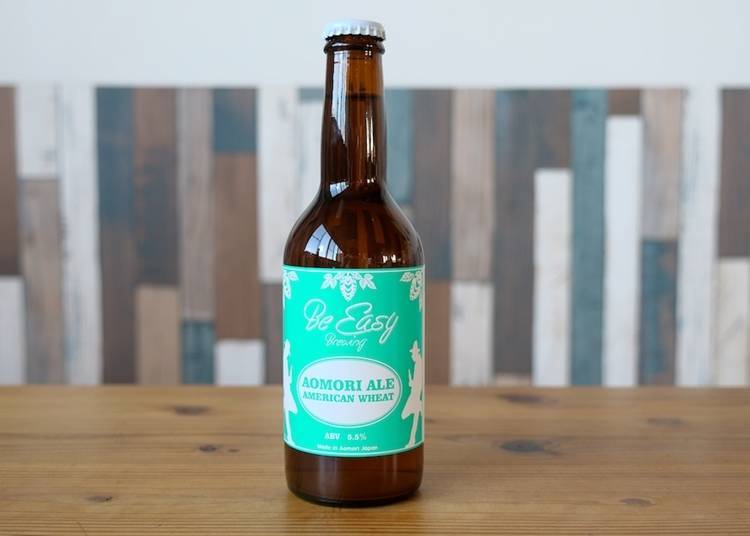
Recommended souvenir shops in Aomori Prefecture
Many of Gareth’s recommendations are not exclusives and can be purchased at souvenir shops and product halls throughout the prefecture. However, the size of each shop and the products available differ, so here are a few recommended locations.
Aomori Prefecture Tourism Information Center Aspam
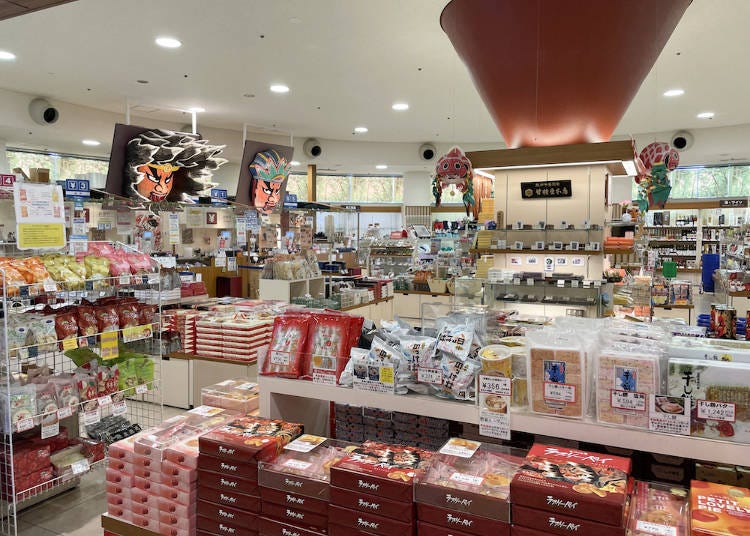
Aomori Prefecture Tourist Center 'Aspam' is about an 8-minute walk from JR Aomori Station. This product hall boasts the largest selection of gourmet products and traditional crafts in the prefecture.
Hours: Vary by store (please check website for details)
Access: About an 8-minute walk from JR Aomori Station
Closed days: December 31st and 2 days in late February
-

-
Address
1-1-40 Yasukata, Aomori City, Aomori Prefecture, 030-0803
View Map -
Nearest Station
Aomori Station (Ou Line / Tsugaru Line / Aoimori Tetsudo)
8 minutes on foot
- Phone Number 017-735-5311
-
Address
1-1-40 Yasukata, Aomori City, Aomori Prefecture, 030-0803
A-FACTORY
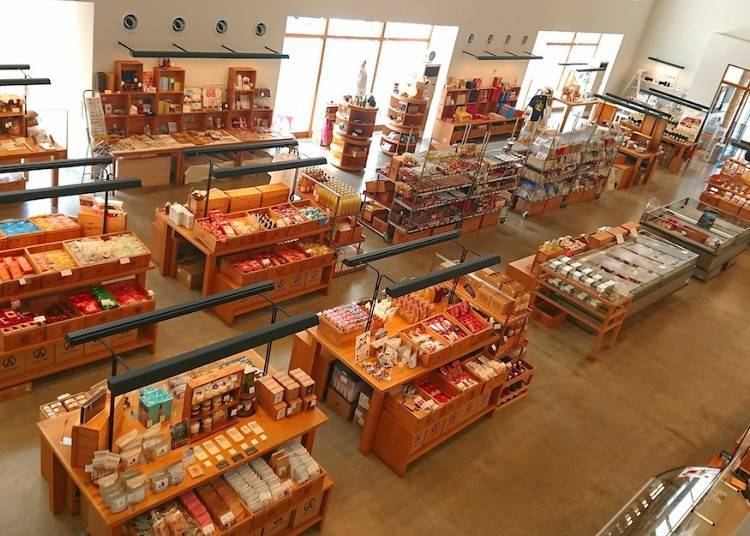
A-FACTORY is a shopping complex right next to Aomori Station that sells local sake, sweets, crafts, and other products.
-
A-FACTORYA-FACTORY
- Address 1-4-2 Yanakawa, Aomori-shi, Aomori-ken 038-0012
- Phone Number 017-752-1890
Hours: 9:00 - 20:00 *Some shops have different hours
Access: 1-minute walk from JR Aomori Station
Closed days: Irregular closures
Tsugaru-han Neputa Village (Antenna Shop Hirosaki Store)
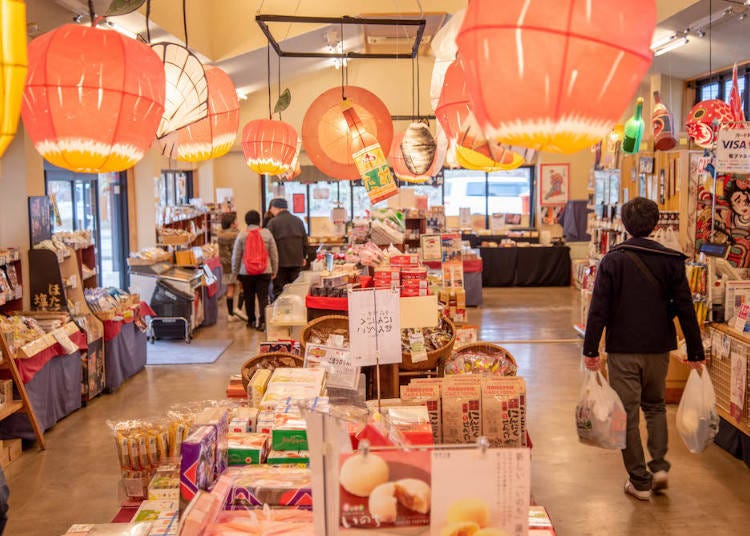
“Tsugaru-han Neputa Village” is an “antenna shop” located in Hirosaki City. In addition to processed agricultural, forestry, and fishery products and sweets unique to the prefecture, it also sells many traditional crafts, including Tsugaru Nuri and kogin-zashi.
-
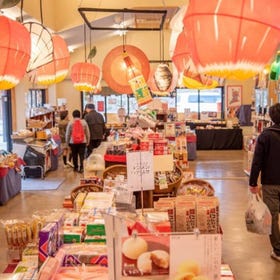 Tsugaru-han Neputa Village津軽藩ねぷた村(アンテナショップ弘前店)
Tsugaru-han Neputa Village津軽藩ねぷた村(アンテナショップ弘前店)- Address 61 Kamenokomachi, Hirosaki-shi, Aomori-ken 036-8332
- Phone Number 0172-39-1511
Hours: 9:00 - 17:00
Access: Take the Konan Bus from JR Hirosaki Station and get off at “Tsugaru-han Neputa Village” bus stop
Closed days: None
Aomori has a multitude of foods and crafts related to its history and culture that make excellent gifts. Keep Gareth’s recommendations in mind when visiting, and be sure you make time to pick up a few unique Aomori souvenirs!
Text by: Tsubasa Shimoda
*The information in this article is accurate as of June 2021. Please check official websites for the latest information.
English translation by Gabriel Wilkinson
- Area
- Category
*Prices and options mentioned are subject to change.
*Unless stated otherwise, all prices include tax.
Popular Tours & Activitiess
Recommended places for you
-

Oirase River
Rivers, Lakes & Canyons
Other Surrounding Areas Of Aomori
-

Aomori Nebuta Festival
Japanese Festivals (Matsuri)
Aomori, Hirosaki And Hachinohe
-
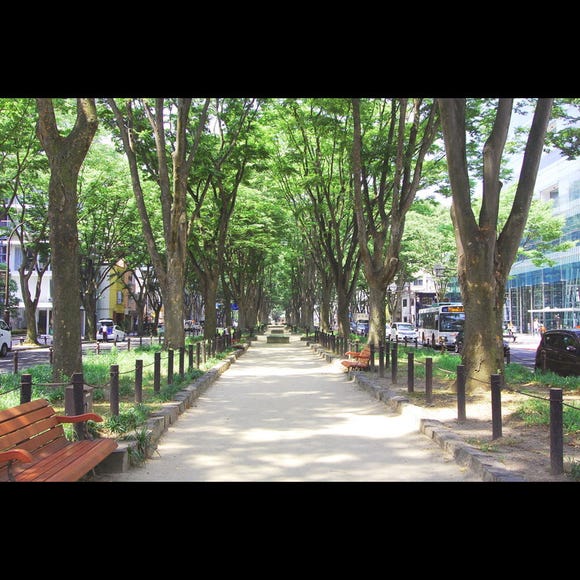
Jozenji Street
Other Townscapes
Sendai And Matsushima
-

Aomori Museum of Art
Art Museums
Aomori, Hirosaki And Hachinohe
-
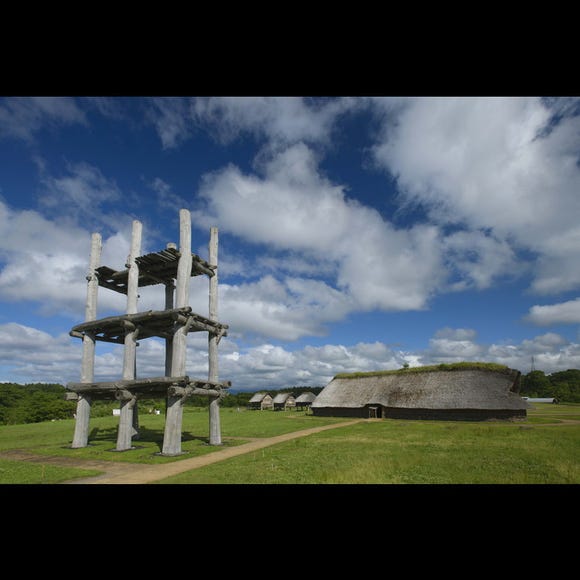
Sannai-Maruyama Site
Village Ruins
Aomori, Hirosaki And Hachinohe
-

Hirosaki Park
Parks
Aomori, Hirosaki And Hachinohe
-
Ad

Discover Kanazawa: History, Culture, and How to Get Around with Ease
-
Ad

Start Your Journey from Yamagata Station: Explore Four Seasons of History, Hot Springs, and Festivals
-
Ad

Explore Snow Country from Echigo-Yuzawa Station: A Year-Round Guide to Ski Resorts, Art, and Regional Travel
-

Aomori's Quiet Side in Autumn: 5 Scenic Spots in Hachinohe According to a Local
by: Marco Blasco
-

8 Luxury Tohoku Ryokans: Private Onsen, Gourmet Wagyu, and Winter Views
by: Sae Haneda
-
Ad

Why Fukushima is the Next Big Food Destination in Japan The Foodie Paradise Only 90 Minutes from Tokyo
-
Ad

Why Are Japanese Wood Furniture Makers, Known for 'Design Masterpieces,' Admired Around the World?
-

Shopping in Akita: 11 Must-Buy Souvenirs & Where to Shop Near the Station and Airport
by: ShiroKu inc.
-

What to Buy in Aomori? 11 Aomori Souvenirs Locals Actually Recommend
by: ShiroKu inc.
-

Togatta Onsen Guide: Best 6 Places to Indulge Yourself in Miyagi Prefecture's Magical Hot Springs Resort Village
-

JR Edition: Visit all of Tokyo in one Day with the Tokyo Metropolitan District Pass!
-

We Board Japan's 'Setsugekka' Resort Train And Have An Incredible Journey Through The Heartland













